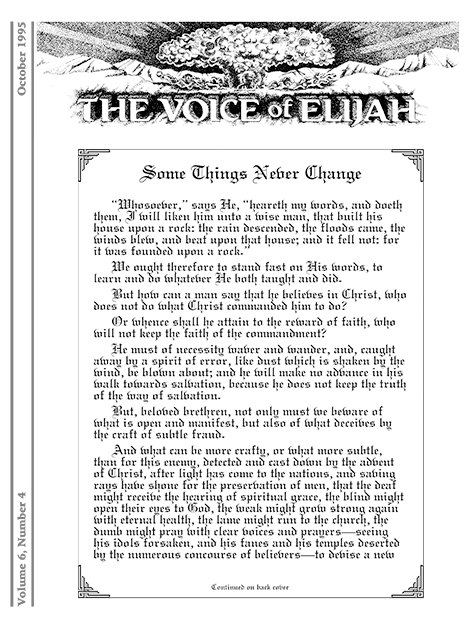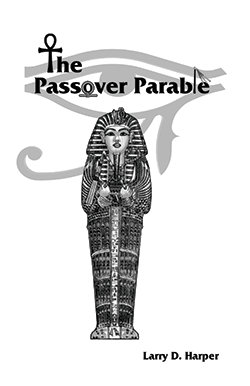What Is a Parabolic Pantomime?
The purpose of a parabolic pantomime is always the same: to establish a parabolic image that the Prophets of Israel could use to describe some future event.
A Parabolic Pantomime Explains What Some Future Event Will Be Like
A parabolic pantomime is an event orchestrated by God to explain what some future event will be like—parabolically speaking. Therefore, a parabolic pantomime has one unique characteristic that sets it apart from all other events—it always involves the direct intervention of God into human affairs. It doesn’t matter whether God intervenes in an immediate, supernatural way, as He did when He destroyed Sodom and Gomorrah with fire and brimstone (Gen. 19:24), or whether He intervenes by specifically directing the actions of others, such as Abraham’s sacrifice of Isaac (Gen. 22:1–18) or the repetitive actions of the priests of Israel described in the Pentateuch. The purpose of a parabolic pantomime is always the same: to establish a parabolic image that the Prophets of Israel could use to describe some future event.
Parabolic pantomimes can either be one-time events, such as Jonah spending three days and nights in the belly of a great fish (Jon. 1:17), or they can be recurring events, such as the annual sacrifice of the Passover lamb and the eating of unleavened bread, or any of the other symbolic rituals prescribed by the Mosaic Law.
The Mystery of the Word of God is both concealed and revealed in the parables of The Teaching of Moses and the prophecies of all the other Prophets of Israel. However, much of its meaning and significance is hidden in the parabolic pantomimes that God orchestrated and had Moses and the other Prophets of Israel record in the Scriptures for the benefit of future generations who would be “granted” insight into their parabolic meaning and significance. It is not by accident that Jesus specifically mentions some of these historical events when He tells those with ears to hear how the future will be like the past:
But He answered and said to them, “An evil and adulterous generation craves for a sign; and {yet} no sign shall be given to it but the sign of Jonah the prophet; for just as Jonah was three days and three nights in the belly of the sea monster, so shall the Son of Man be three days and three nights in the heart of the earth.”
(Matthew 12:39–40) —NASB
“For the coming of the Son of Man will be just like the days of Noah. For as in those days which were before the flood they were eating and drinking, they were marrying and giving in marriage until the day that Noah entered the ark, and they did not understand until the flood came and took them all away; so shall the coming of the Son of Man be.”
(Matthew 24:37–39) —NASB
“It was the same as happened in the days of Lot: they were eating, they were drinking, they were buying, they were selling, they were planting, they were building; but on the day that Lot went out from Sodom it rained fire and brimstone from heaven and destroyed them all. It will be just the same on the day that the Son of Man is revealed. On that day, let not the one who is on the housetop and whose goods are in the house go down to take them away; and likewise let not the one who is in the field turn back. Remember Lot’s wife.”
(Luke 17:28–32) —NASB
Related Information

Is Iraq Mystery Babylon?
During the Gulf War, prophecy “experts” were declaring Iraq was Mystery Babylon. But was it really? This article not only explains how the Tower of Babel provides the parabolic image the Prophets had in mind when they spoke of “Mystery Babylon” but also reveals who that harlot described in Revelation 17–19 actually is.

I’s Just Wonderin’, Is Anybody Headin' That Way Yet?
After a short personal testimony concerning how his own foibles and failures prevented him from finding his way back to the joy of the new birth, the author discusses four mental hurdles that True Believers must surmount if they are serious about following “The Way” back to God.

Two Agreements Made: One a “Covenant,” the Other a “Testament”
This is the fourth in a series of articles whose purpose is to explain what the Apostle Paul had in mind when he talked about “law” and “the Law.” It builds on information presented in the July 1998, January 2000, and April 2001 issues of the newsletter. The article reviews the contents of the first three articles before explaining Paul’s use of the term law in the Book of Galatians.

The Passover Parable
Jesus said the writings of Moses, the Prophets, and the Psalms—that is, the entirety of the Hebrew Scriptures—are all about Him (Luke 24:27, 44; John 5:46). Yet few today can find any reference to Jesus Christ in the Hebrew Scriptures because they don’t understand that God has used parables since the time of Moses to speak concerning His Son. The Passover Parable is at the heart of God’s message concerning His Firstborn Son, Jesus Christ. That message can be seen in the carefully orchestrated parabolic pantomime that God directed Corporate Israel, His Firstborn Son (Ex. 4:22), to enact during the Exodus of the sons of Israel from Egypt.
The Truth is Available
Check Out the Online Library
Browse through our library of eBooks and newsletters—absolutely free!
Start Reading Now